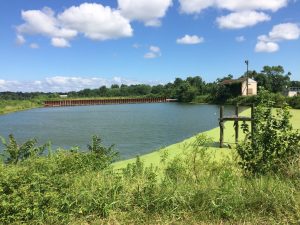
BERLIN – New reports detail the hefty costs associated with repurposing the ponds at Berlin Falls Park.
At Monday’s meeting of the Berlin Town Council, town staff presented the results of several studies completed this summer regarding the 64-acre Berlin Falls Park. The property has been the subject of various environmental studies in light of its 40-year history as a chicken processing plant.
“The scientists determined there was no microbiological hazard so there’s no impetus or public safety need to remediate the ponds,” said Laura Allen, Berlin’s town administrator. “This is good news because the report indicated that if the town were to remediate all three of the ponds the price tag would be about $7 million.”
Allen went over the results of a recently completed EA Engineering report, which she said had been necessary to ensure there was no bacteria in the ponds. While the water had been tested before the town purchased the property, the sediment at the bottom of the ponds had not been tested. Allen said that while the report revealed there was no reason to be concerned about bacteria in the ponds the actual layers of sediment would be an issue if the ponds were to be actively used.
“I asked EA to provide some options,” Allen said.
The report details each of the three ponds, identifying them as the north, middle and south lagoons. The document states that the north lagoon is no deeper than 2.5 feet with sediment volume of 14,383 cubic yards. The middle lagoon, in contrast, is no deeper than 1.7 feet but contains 66,173 cubic yards of sediment that ranges in thickness from 3.5 feet to 5.5 feet. The south lagoon’s water depth ranges from eight to 10 feet but has less than two feet of sediment.
Allen said that in early plans for the park, there was talk of filling in the first pond and using that space to build an amphitheater. The report sets the cost for filling the pond in at $2.5 million.
“We’re not just talking about throwing in some soil but it’s actually engineered and compacted enough that you could turn around and construct on top of it,” Allen said.
Other alternatives and associated costs detailed in the report include dredging the lagoons and disposing of the extra soil on site as well as offsite. Allen said that while nothing had to be done to the ponds now, as they were not actively being used, the sediment issue would have to be addressed if they were to be used for swimming or kayaking, for example.
“These aren’t things we’re necessarily recommending this is more information that we’re gathering to help you make decisions with regard to ways to develop the park,” Allen said. “To a large extent what the town does with those ponds is dependent on how the council wants to use the property.”
Another report the council reviewed Monday regarding the park was put together by Conservation Community Consulting. David Deutsch, the town’s project coordinator, said it was an interpretive plan outlining how the park could be used passively. It describes potential for three roughly half-mile trails within the park, around its ponds. Various interpretive signs could educate the public on the park’s native wildlife, which includes turtles as well as a large number of bird species. The plan states that little things like basking platforms and floating wetlands could be added to the ponds to increase visitors’ chances of seeing the animals.
The Conservation Community Consulting plan states that motorized vehicles have “highly degraded” the wooded wetlands on the park property and that vehicle use should be prohibited in the woods. Nevertheless, just last week 1,000 Jeeps visited the park to travel its trails during Berlin Jeep Jam. Organizers of that event told the council Monday that they’d be eager to use the property again.
“This was intended to be the last Jeep Jam,” Allen said during an interview Tuesday, adding that the town was still determining which uses were most compatible with the park. “I’m sure there are things we could do that are better suited to the environment.”
Deutsch pointed out that the interpretive plan presented by Conservation Community Consulting could be implemented for $275,900 in contrast to the millions it would cost to remediate the ponds.
“One good thing about their report is the price tag is in a league that is somewhat manageable,” he said, adding that the report also detailed potential partners for the various aspects of implementation. “It doesn’t necessarily all have to be done at once. You’ve got a great piece of property and if their recommendations are implemented in some fashion you’ll be able to enhance the enjoyment of the park.”
Yet another report presented Monday details the costs associated with renovating the large building near the entrance to Berlin Falls Park. The report, prepared by Davis, Bowen & Friedel Inc., sets the cost for making the building usable at $2.3 million.
“What does it get you? It gets you a building that gets repaired. It doesn’t give you a building that’s ready for active use,” Deutsch said.
He explained that that estimate would cover the cost of repairing the building’s structural damage but did not include repairing any of the building’s electrical or mechanical systems. The town is now exploring the cost of demolishing the building.
“The ground is valuable even if you decide not to retain the building,” Deutsch said.
Allen said she expected the town to receive those estimates later this fall. In the meantime, Mayor Gee Williams said he planned, with the council’s approval, to establish a Berlin Falls Park advisory committee in the coming months. He said the park’s redevelopment would be a generational project but one that all citizens could look forward to.
“This is exciting because it’s truly a community effort,” he said. “We’re open to all kinds of ideas.”
The reports discussed this week can be viewed on the town’s website, www.berlinmd.gov.

